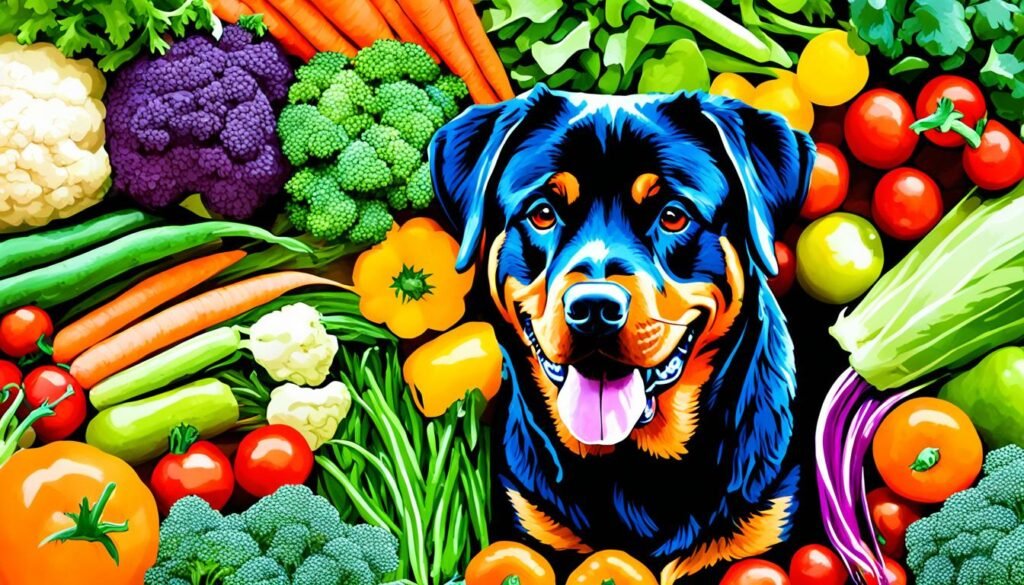As a responsible pet owner, I understand the importance of providing a balanced and nutritious diet for my Rottweiler. While it’s essential to meet their dietary needs, I want to ensure their safety and well-being. One question that often arises is whether Rottweilers can eat carrots. Today, I want to shed light on this topic and provide vet-approved advice on feeding carrots to Rottweilers.
Carrots are indeed safe for Rottweilers to consume. In fact, they offer numerous health benefits and are packed with essential nutrients. However, it’s crucial to consult with a veterinarian before introducing any new vegetable into your Rottweiler’s diet, including carrots.
Key Takeaways:
- Carrots are safe for Rottweilers to eat and provide various health benefits.
- Consult with a veterinarian before introducing carrots or any new vegetable into your Rottweiler’s diet.
- Carrots offer essential nutrients that promote vision, healthy skin, and overall well-being.
- Ensure carrots are cut into small pieces to prevent choking hazards.
- Follow feeding guidelines and consult with a veterinarian to determine the right amount and frequency of carrot consumption for your Rottweiler.
Vegetables Safe for Rottweilers
Along with carrots, there are other vegetables that are safe for rottweilers to eat. Incorporating these vegetables into a rottweiler’s diet can provide a variety of nutrients and contribute to their overall nutrition. Here are some safe vegetables for rottweilers:
- Sweet potatoes: Rich in vitamins and fiber, sweet potatoes are a nutritious addition to a rottweiler’s diet.
- Broccoli: Packed with vitamins and minerals, broccoli can be steamed or lightly cooked for rottweilers to enjoy.
- Pumpkin: A great source of fiber and antioxidants, pumpkin can aid in digestion and promote a healthy weight in rottweilers.
- Green peas: These tiny vegetables are high in protein and provide essential vitamins and minerals for rottweilers.
- Celery: Low in calories and a good source of hydration, celery can be a refreshing and crunchy snack for rottweilers.
- Cabbage: Whether served raw or cooked, cabbage is a low-calorie vegetable that offers vitamins and minerals for rottweilers.
To incorporate these vegetables into a rottweiler’s diet, they can be steamed, boiled, or lightly cooked. Alternatively, some vegetables can be served raw as long as they are safe for consumption. Remember to consult with a veterinarian to ensure the right amount and frequency of vegetable consumption for your rottweiler.
Health Benefits of Feeding Carrots to Rottweilers
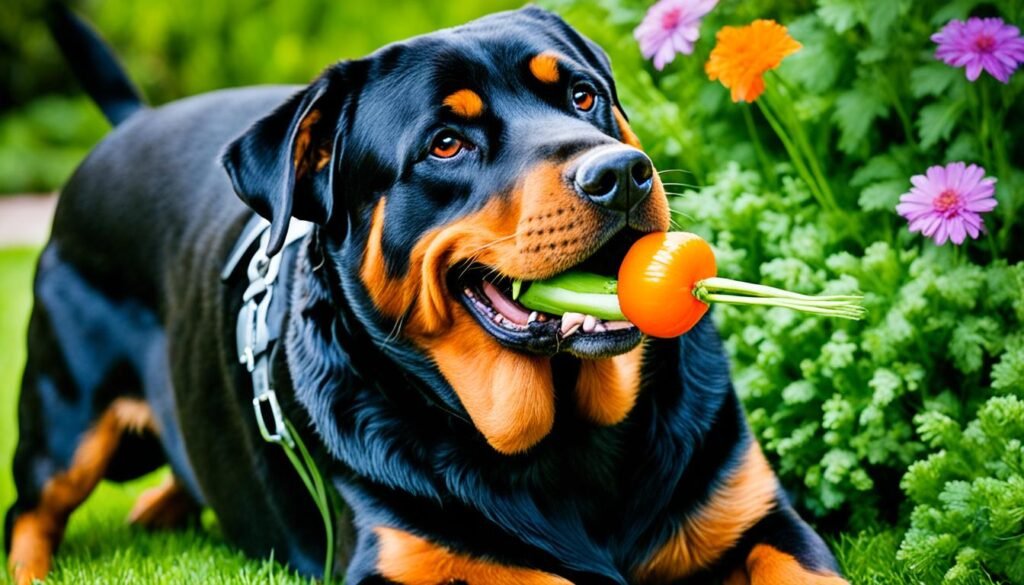
Feeding carrots to rottweilers can provide numerous health benefits. Carrots are packed with essential nutrients that contribute to the overall well-being of your furry friend.
- Carrots contain beta carotene, a powerful antioxidant that supports eye health and enhances vision.
- They are a great source of fiber, aiding in digestion and promoting a healthy gastrointestinal system for your rottweiler.
- Vitamins A, C, and K found in carrots contribute to a robust immune system and help prevent various diseases.
Incorporating carrots into your rottweiler’s diet can also contribute to their skin health. The nutrients in carrots promote a smooth and shiny coat, keeping your rottweiler looking their best.
When feeding carrots to your rottweiler, it is important to cut them into small pieces to prevent any choking hazards. By doing so, you can ensure that your rottweiler can enjoy the numerous health benefits carrots have to offer. Providing your rottweiler with a variety of rottweiler-friendly vegetables, including carrots, can help promote a balanced and nutritious diet.
Continue reading to learn more about safe vegetables for rottweilers and how to incorporate them into their diet.
Feeding Guidelines for Rottweilers and Carrots
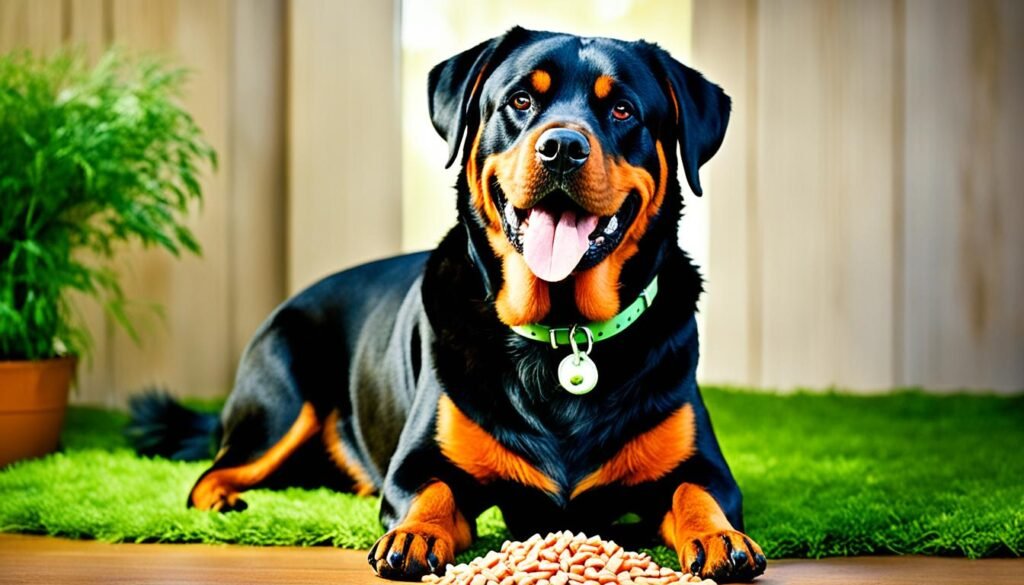
When it comes to incorporating carrots into a Rottweiler’s diet, it’s essential to follow specific feeding guidelines to ensure their safety and nutritional benefits. Here are important guidelines to keep in mind:
- Cut carrots into tiny pieces: To prevent choking hazards, always cut carrots into small, bite-sized pieces before feeding them to your Rottweiler. This ensures easy consumption and minimizes any risks.
- Consult with a veterinarian: Every Rottweiler is unique, and their nutritional needs may vary. Consulting with a veterinarian is crucial to determine the appropriate amount of carrots and the frequency of their consumption based on your individual Rottweiler’s age, weight, and overall health.
- Thoroughly wash carrots: Before feeding carrots to your Rottweiler, make sure to wash them thoroughly to remove any dirt, pesticides, or other contaminants. This keeps the carrots safe for consumption and avoids any potential health risks.
By following these feeding guidelines, you can ensure that your Rottweiler safely benefits from the nutritious qualities that carrots provide. Always prioritize your Rottweiler’s well-being and consult with a veterinarian for the best feeding practices.
Other Safe Vegetables for Rottweilers
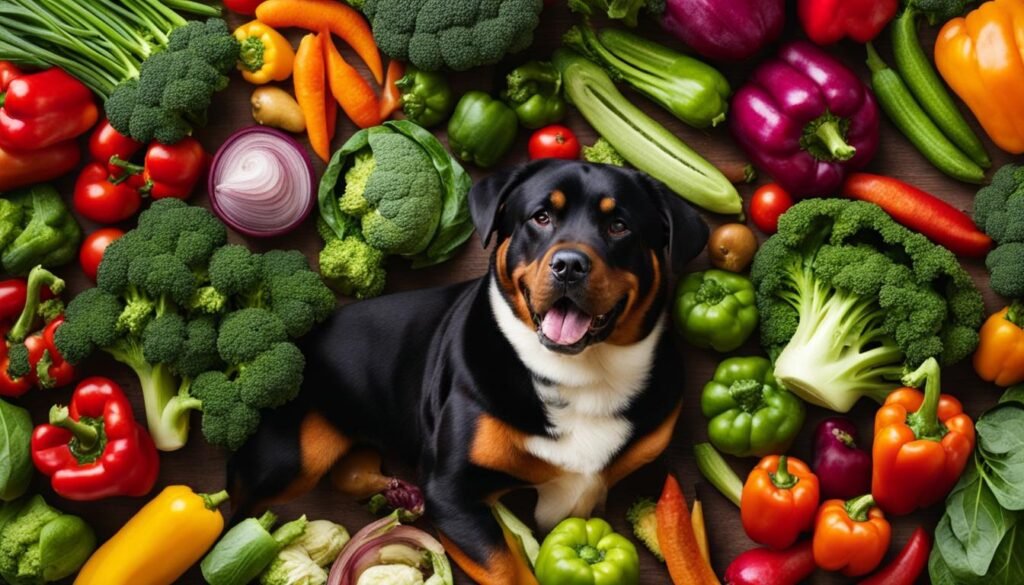
Apart from carrots, there are other safe vegetables that rottweilers can enjoy. These rottweiler-friendly vegetables provide a variety of nutrients and can be prepared in different ways to suit your dog’s preferences. Consider adding these safe vegetables to your rottweiler’s diet:
- Pumpkin
- Green peas
- Celery
- Cabbage
- Sweet potatoes
- Asparagus
- Green beans
- Broccoli
- Brussels sprouts
- Zucchini
- Spinach
- Lettuce
- Squash
- Beetroot
- Cauliflower
- Soybeans
- Radish
These safe vegetables offer a range of beneficial nutrients and can be a great addition to your rottweiler’s meals. Depending on your dog’s preferences, you can steam, boil, bake, or serve them raw. Remember, not all vegetables are suitable for rottweilers, so it’s important to consult with a veterinarian to ensure the safety and proper inclusion of vegetables in their diet.
Tips for Incorporating Vegetables into a Rottweiler's Diet
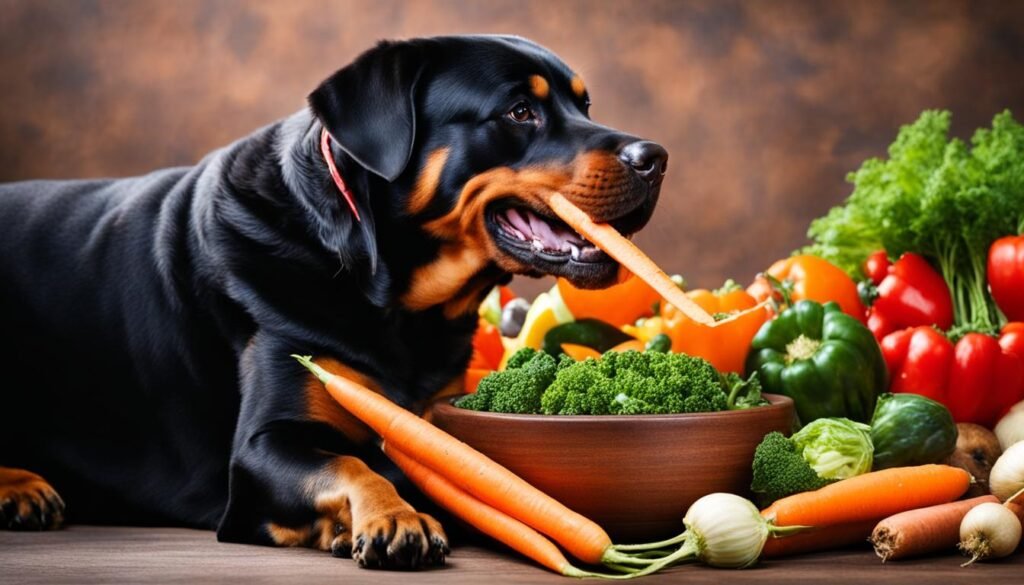
Introducing vegetables into a rottweiler’s diet can be a beneficial way to enhance their nutrition and overall health. When it comes to incorporating carrots into a rottweiler’s diet, there are various methods you can try. One simple way is to offer carrots as standalone treats. These crunchy, orange snacks are not only delicious but also provide a good source of vitamins and fiber. If your rottweiler enjoys a little extra flavor, you can also mix carrots with dog-friendly ingredients like peanut butter for an added treat. Remember to use peanut butter without xylitol, which can be toxic to dogs.
Aside from carrots, other vegetables can be incorporated into a rottweiler’s diet in different ways. Steaming vegetables like broccoli or green peas can help retain their nutrients while making them easier to digest. Boiling or baking vegetables like sweet potatoes can offer a tasty and nutritious addition to your rottweiler’s meal. Some rottweilers may even enjoy raw vegetables like celery or cabbage as a crunchy snack.
When starting to introduce vegetables, it’s important to begin with small quantities and monitor your rottweiler’s response. Some dogs may have sensitive stomachs or specific preferences, so it’s essential to observe how they react to the new food. If all goes well, gradually increase the amount and variety of vegetables in their diet. This will help ensure a balanced and nutritious meal for your rottweiler.
Remember to consult with a veterinarian for specific feeding guidelines and to address any concerns or questions you may have. They can provide personalized advice based on your rottweiler’s individual needs and dietary requirements.
- Offer carrots as standalone treats or mix them with dog-friendly ingredients like peanut butter for added flavor
- Steam vegetables like broccoli or green peas to retain nutrients
- Boil or bake vegetables like sweet potatoes for a tasty addition to meals
- Some rottweilers may enjoy raw vegetables like celery or cabbage as a crunchy snack
- Start with small quantities and gradually increase the amount and variety of vegetables in their diet
Can Dogs Eat Carrots? Benefits and Precautions

Carrots are a safe and nutritious vegetable for dogs, including rottweilers. They offer a range of benefits that can contribute to your rottweiler’s overall health and well-being.
One of the key advantages of feeding carrots to rottweilers is their high vitamin content. Carrots are packed with essential vitamins, including vitamin A for improved vision, vitamin C for a strong immune system, and vitamin K for blood clotting.
Additionally, carrots are an excellent source of dietary fiber. Fiber plays a crucial role in promoting healthy digestion and can help prevent constipation in dogs.
Feeding carrots to your rottweiler can also promote good dental hygiene. The chewing action required to eat carrots can help remove plaque and tartar buildup, reducing the risk of gum disease and bad breath.
For puppies, carrots can be especially beneficial. The crunchy texture of carrots can help soothe teething discomfort and provide a healthy alternative to chew on.
However, it is important to take certain precautions when feeding carrots to dogs. To prevent choking, always cut carrots into appropriate sizes for your rottweiler. Additionally, consult with your veterinarian before introducing any new vegetables into your dog’s diet to ensure they are suitable for their specific needs.
Remember to wash carrots thoroughly before serving them to your rottweiler. This helps remove any potential dirt or pesticides that could be harmful to your dog.
By incorporating carrots and other safe vegetables into your rottweiler’s diet, you can provide them with a diverse range of nutrients and contribute to their overall health. Just remember to take precautions, consult with your vet, and enjoy the benefits of vegetable consumption for your beloved rottweiler.
Conclusion
In conclusion, rottweilers can safely eat carrots and a variety of other vegetables. Incorporating carrots into a rottweiler’s diet can provide several health benefits, such as vitamins A, C, and K, as well as fiber and beta carotene. These nutrients can contribute to their overall well-being, promoting healthy vision and skin.
However, it is crucial to follow feeding guidelines and consult with a veterinarian to ensure the right amount and frequency of vegetable consumption for rottweilers. Additionally, other safe vegetables for rottweilers include sweet potatoes, broccoli, pumpkin, green peas, celery, and cabbage, which offer different nutrients and can be prepared in various ways.
By offering a balanced diet that includes rottweiler-friendly vegetables, owners can provide their beloved pets with a nutritious and diverse range of foods. Remember to always properly wash and prepare vegetables, cut them into appropriate sizes, and observe how your rottweiler responds to new foods. With these considerations, you can create a wholesome diet that supports your rottweiler’s health and happiness.
FAQ
Can rottweilers eat carrots?
Yes, rottweilers can safely eat carrots.
What are the health benefits of feeding carrots to rottweilers?
Carrots provide various health benefits, including enhanced vision, healthy skin, and overall well-being.
How should I incorporate carrots into a rottweiler’s diet?
Carrots can be fed as standalone treats or mixed with other dog-friendly ingredients like peanut butter.
What other vegetables are safe for rottweilers to eat?
Other safe vegetables for rottweilers include sweet potatoes, broccoli, pumpkin, green peas, celery, and cabbage.
What are the feeding guidelines for rottweilers and carrots?
It is recommended to consult with a veterinarian to determine the right amount and frequency of carrot consumption for your rottweiler.
Can rottweilers eat other vegetables besides carrots?
Yes, rottweilers can eat a variety of vegetables, including pumpkin, green peas, celery, cabbage, sweet potatoes, and more.
How can I incorporate vegetables into a rottweiler’s diet?
Vegetables can be prepared in various ways, such as steamed, boiled, baked, or raw, depending on the rottweiler’s preference and digestion.
What are the benefits and precautions of feeding carrots to dogs?
Carrots offer numerous benefits and serve as a healthy and low-calorie snack. Precautions include cutting carrots into appropriate sizes to prevent choking, consulting with a veterinarian, and ensuring proper washing and preparation of vegetables.
